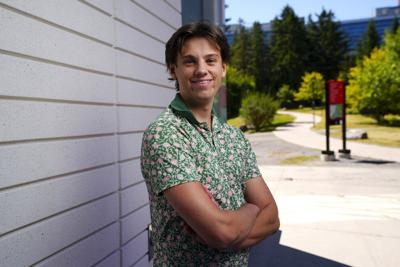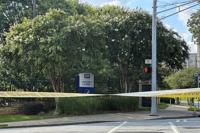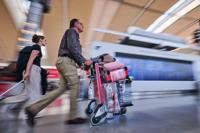As post-secondary students head back to school in September, some say the everyday challenges of campus life are only amplified by a cost-of-living crisis, societal pressures and an increasingly fractured political climate.
HereÔÇÖs a look at whatÔÇÖs been weighing heavily on the minds of some university students as they prepare to go back to the classroom.
ÔÇö
Anxiety amid cross-border political tensions
Ben Carpenter, an incoming fourth-year student at Carleton University in Ottawa, decided to move to Canada from the United States for school because he found the tuition to be more affordable.
But being an American in CanadaÔÇÖs capital during a tariff war and U.S. President Donald TrumpÔÇÖs calls for a 51st state has been a strange experience, he said. He doesnÔÇÖt immediately tell people heÔÇÖs from the U.S., he added, given the tension between the two countries.
ÔÇť(Ottawa) is clearly anti-Trump,ÔÇŁ said Carpenter. ÔÇťIt is also clearly anti-America, which is for good reason and doesn't upset me.ÔÇŁ
Carpenter also worries whether heÔÇÖll be able to stay in Canada long term, especially since his partner and friends live in Ottawa. As a gay man, heÔÇÖs especially wary about the safety of LGBTQ+ people in America, he said.
Though heÔÇÖs eligible for a post-graduate work permit in Canada, Carpenter said heÔÇÖs conscious that immigration rules in both countries have been in flux the past couple of years.
ÔÇťI understand there is a pretty prevalent view among a lot of people that immigration rules have been too lax, and I see the government responding to that by tightening them,ÔÇŁ said Carpenter. ÔÇťThat, of course, is scary to me just because I would like to stay.ÔÇŁ
Carpenter added that heÔÇÖs trying his best not to worry too much ÔÇô he doesnÔÇÖt want these challenges to interfere with his life in Ottawa.
"I just focus on making it through the day because if I do have to leave Canada then I don't want to feel like I wasted any time.ÔÇŁ
ÔÇö
The struggle with AI and social media
Rylande Horsman, a student going into her third year at Nipissing University, said her phone addiction is hard to break and ÔÇťtakes away from being able to study.ÔÇŁ
ÔÇťI find that when I'm at the library and I'm really trying to lock in when the motivation is so low, I'll just say, 'Oh, I'll take a five minute break,'" said Horsman. "Five minutes turns into 20 minutes, 20 minutes turns it into a half an hour."
The problem is only made worse by the constant flow of online posts from peers that make her feel insecure, she said.
ÔÇťTheir schedules are jam-packed and they seem to be doing absolutely incredible at every single thing that they're doing,ÔÇŁ said Horsman. ÔÇťWe're like, ÔÇśMan, I need to step it up a bit, I need to do more,ÔÇÖ when the reality is that everyone struggles.ÔÇŁ
Abby Noonan, who also goes to Nipissing, said sheÔÇÖs feeling the impact of the rising use of artificial intelligence in school. She said she's often seen classmates use generative AI to do assignments, which she called ÔÇťfrustrating and really discouraging.ÔÇŁ
ÔÇťIt's hard to put in effort in an assignment when you know that someone's generating the same essay in two seconds and they're still getting a better grade than you,ÔÇŁ said Noonan. ÔÇťIt almost feels like what's the point, you know?ÔÇŁ
ÔÇö
Costly commutes and burnout fears
Maeve Villeneuve-Elson lives in the west Ottawa suburb of Stittsville, and said the looming daily commute to Carleton University and part-time job ÔÇťweighs on my mind.ÔÇŁ
Villeneuve-Elson said recent changes in the cityÔÇÖs transportation routes and schedules, coupled with the schoolÔÇÖs recently announced restrictions on parking permits, means facing ÔÇťwell over two hoursÔÇŁ to commute in the evening.
ÔÇťI will go to bed stressing, staring at the ceiling, stressing about if one bus is late, it could ruin my entire day."
With limited access to a car, Villeneuve-Elson is concerned about the commute's impact on their social life and ability to take on shifts at work.
The student hopes professors and business owners have patience with students who are commuting in a city thatÔÇÖs seeing fast population growth and increased congestion.
ÔÇťI know a lot of people who are older than me, who are in an older generation tend to view Gen Z as being constantly late to things,ÔÇŁ Villeneuve-Elson said.
ÔÇťA lot at the time, I find, especially for university students, thatÔÇÖs because of these unreliable cycles that all push upon one another, which ultimately leads to stress burnouts.ÔÇŁ
ÔÇö
Back to school ÔÇô but at what cost?
Iyiola Alande, a student at Trent University, said his biggest challenge is planning his finances ahead of the semester. He said a lot of students, particularly international students like himself, thought the affordability crisis Canada saw coming out of the COVID-19 pandemic would be temporary.
ÔÇťWe didn't anticipate a consistent inflation problem,ÔÇŁ he said. ÔÇťSo it's been hard for a lot of students like myself to plan out their degree.ÔÇŁ
Affordability weighs heavily on students' minds, he said, as they have to figure out how to juggle bills, rent, and rising tuition costs. It can be especially hard for international students who are limited to 24 hours of work per week during the school year, he added.
ÔÇťPeople think students nowadays are just lazy and don't realize that we're just living in very, very different times,ÔÇŁ he said.
ÔÇö
This report by ║├╔źtvwas first published Aug. 24, 2025.















































